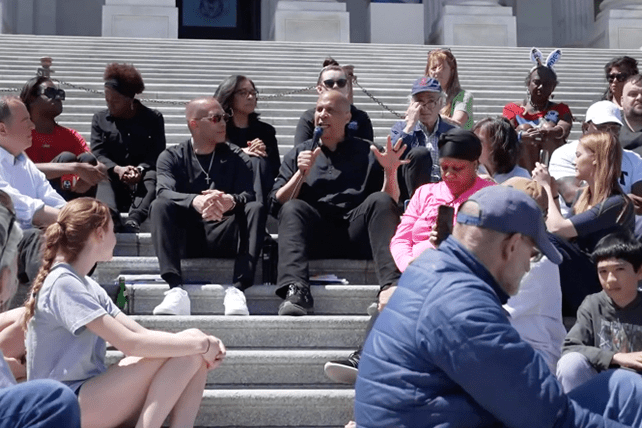Sen. Chris Coons of Delaware — a Democrat and Presbyterian who graduated from Yale Divinity School — was one of several Democrats who publicly celebrated the activism.
“Faith leaders have been at the forefront of every progressive movement in our nation’s history – from abolition to labor rights to civil rights and on – so I’m glad to see faith leaders speaking out and getting into good trouble in opposition to the upcoming reconciliation bill,” Coons told RNS in a statement, referring to Barber’s arrest.
Coons added that “there are over 2,000 references to caring for the poor in Scripture” — a topic he discussed with Booker when the New Jersey senator took questions during his 25-hour speech in late March — and said he doesn’t “believe passing a bill that takes away health care from our most vulnerable in order to pay for new tax breaks for the wealthiest Americans aligns with Jesus’ teachings.”
Braunstein said Democrats’ pivot to faith doubles as a rejection of the idea that the Republican Party is the truly religious party — and an acknowledgment of the powerful role faith continues to play in American politics.
“I think what we’re seeing is a very clear strategy by some prominent Democrats to be louder about the role of their faith.”
Also important, she said, is how many of the loudest voices among lawmakers and faith leaders are people of color.
“As much as we talk about white evangelicals as being this stalwart bloc of Republicans, the most consistent and loyal partisans in this country are Black Christians, and they consistently vote Democratic,” she said.
For his part, Booker repeatedly appealed to faith during that marathon speech — which attracted widespread attention and became a source of inspiration for some liberals — before winding down with several phrases long used in progressive religious circles.
“This is a moral moment. It’s not left or right; it’s right or wrong,” Booker said, before concluding with a line made famous by the late Georgia congressman and civil rights icon John Lewis: “Let’s get in good trouble.”
“He quoted from our movement,” Barber said of Booker, who has previously participated in some of Barber’s demonstrations.
Asked about lawmakers’ endorsement of his activism, Barber said he hoped lawmakers would “invite” religious leaders in — as well as people who might be negatively impacted by the budget proposals.
Lawmakers have, in fact, invited religious activists into the Capitol, but the fledgling alliance appears to be a delicate balance, with figures on both sides steering clear of explicit coordination. Barber has long refused to allow lawmakers to speak at his protests, and he told RNS he was unaware Jeffries and Booker were planning their sit-in until he received a call about the event the night before. Barber also said that before his arrest at the U.S. Capitol, he was escorted into the building by staff members from the office of Rep. Jamie Raskin — a lawmaker who has attended some events led by Barber — but stressed the aides were not aware of the pastor’s protest plans.

